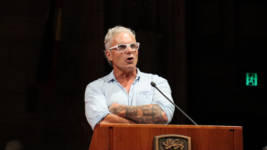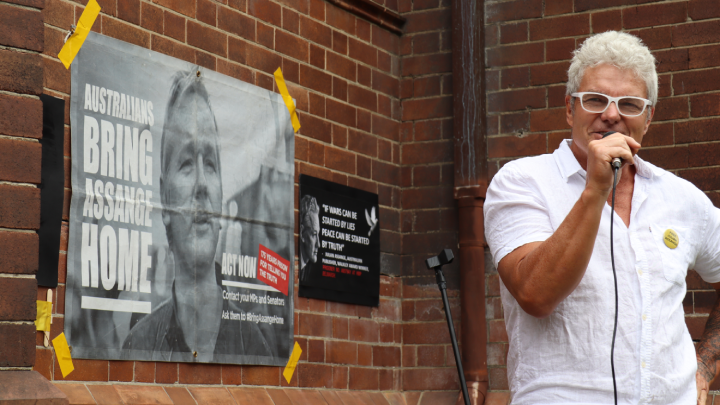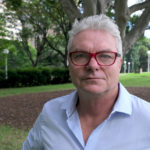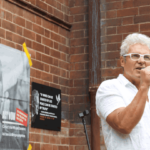McBride’s Criminal Trial Date Set Next Week, as the ADF Whistleblower Faces Hard Time

Due to his whistleblowing efforts, which exposed Australian special forces officers having committed war crimes in Afghanistan, former Australian Defence Force lawyer David McBride is a hero to many in this country.
So, it’s difficult to have heard him say at recent events that he expects to be spending time in prison following his trial, where the prosecution will argue that he, in having divulged classified information, threatened national security.
“When I am in gaol, which is likely to happen, because the Americans want it to happen, and Albanese can’t say no to the Americans, you people will make me smile,” McBride told a crowd of Julian Assange supporters, out the front of the prime minister’s Marrickville office on 10 December.
McBride leaked classified ADF documents to the ABC over 2014 to 2016, which contained the details that went on to form the basis of the 2017 Afghan Files report. And David only did this after he’d first gone to his superiors in the military with his concerns, which failed to trigger any internal action.
The father-of-two is now set to appear before the ACT Supreme Court early next Tuesday morning, 11 April, to set the date for his criminal trial, which will see him tried over face five national security offences that could result in him spend the rest of his life in prison.
Suppressions upon suppressions
“I feel like I am going to be convicted,” McBride told Sydney Criminal Lawyers last December. “I do feel that I will get a long sentence, with the maximum being unlimited. Even if the judge has some sort of sympathy for me, it will be hard for him not to give me 20 years.”

The prosecution against McBride was launched in 2019, under then attorney general Christian Porter. And on inheriting three high-profile whistleblower prosecutions last May, current AG Mark Dreyfus chose to only end one, that of Timor-Leste bugging whistleblower Bernard Collaery.
Dreyfus, however, continued the prosecutions against McBride and ex-ATO officer Richard Boyle. And the chief lawmaker further required both men to argue their defence under the Public Interest Disclosure Act 2013 (Cth), which he drafted and has since admitted is failed law.
Indeed, while Dreyfus suggested in opposition that he would be overhauling the PID Act on retaking office, he formally commenced the process last November, which was the month following both Boyle and McBride having fronted up to the courts to argue their defence under the dodgy law.
And the heights of absurdity were really reached when McBride attempted to put his defence, as barriers so overwhelming were put in his path that his legal team decided not to continue with the proceedings.
Despite his case already being draped in the secrecy of a national security order, the prosecution was set to challenge the only two witnesses McBride had, while a further public interest immunity (PII) claim was placed on proceedings, which meant the prosecution could remove his evidence.
“They then imposed this PII, which means they can remove evidence, so the evidence becomes unavailable to you,” McBride’s lawyer Mark Davis said in the days following. “It is also unavailable to the judge. It’s unavailable to anyone, but most significantly, it is unavailable to the defence.”
Two charged over Afghanistan
The Brereton report into Australian war crimes in Afghanistan was released in November 2020. It recommended 36 matters involving 19 Australian troops be investigated as potential war crimes.
Yet, McBride continued to be prosecuted for exposing similar information, and the irony was lost on no one.
For close to two and a half years, people were able to remark that despite the crimes exposed by the Brereton inquiry, only one person had been charged in relation to these matters and that was a whistleblower.
But this has all changed now, as the AFP announced on 20 March that a joint investigation with the Office of the Special Investigator has resulted in the arrest of a former Australian soldier living in NSW, who’s been charged with the murder of an Afghan man whilst he was serving in the ADF.
“This is the first war crime charge of murder to be laid against a serving or former Australian Defence Force member under Australian law,” reads the AFP media release.
Yet, while this has served to improve the imbalance that saw McBride the only one charged in relation to Afghan war crimes, it’s done nothing to resolve the situation where a man who exposed wrongdoing is now set to be punished severely for his efforts.
“Put me in gaol Anthony Albanese and you will look like a fool, and I will look like a hero, because I’ve just stood up. We stand for truth. We stand for values,” a defiant McBride said as he addressed the 4th March Belmarsh Tribunal in Sydney: an event which considered the plight of Assange.
“And we are going to take Australia back from the creeps who only want pay rises and want to crawl to another country. We say no. We say put us in gaol. We’re not afraid. And we will win because we are right.”







